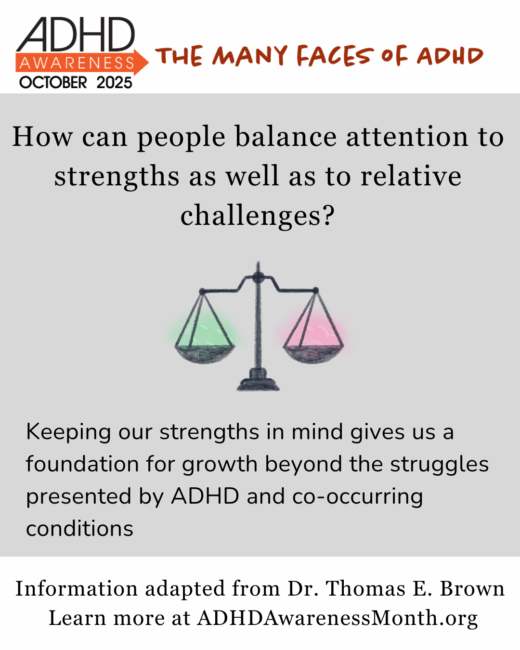ADHD is not a simple disorder.
While we need to keep in mind co-occurring conditions, we need to also focus and building on a person’s strengths. Keeping our strengths in mind gives us a foundation for growth beyond the struggles presented by ADHD and co-occurring conditions. Dr. Thomas E. Brown has suggestions.
Transcription follows this 2:45 minute video
Have trouble understanding or hearing?
Click the Subtitles/Closed Caption icon at the bottom right while watching the video.
Lightly Edited Transcript
ADHD Awareness Month
Reframing ADHD
Discovering New Perspectives

ADHD is often not simple. Many people still think of it as primarily something characterized by hyperactivity, and I think it’s important to restate the fact that there are some people with ADHD who’ve never been hyperactive and their problem is they tend to be more sluggish, sometimes, in terms of their ability to get things done. You know, it’s important to look at these things, but also to keep in mind that they may have important strengths.
You know, I think at the same time we have to talk about comorbidities, on what other difficulties a person has, keep in mind what the strengths of the person are because that’s what they can build on. You know, and I think to ignore the person’s strengths is a mistake because often people who have ADHD begin to question themselves all the time and ignore some of the real strengths they do have.
But at the same time to be open to the fact that some people who may be very bright and very competent in many other ways may very well be struggling also with depression or with anxiety, with mood problems, with excessive use of marijuana or excessive use of alcohol or other drugs. And these other things need to be taken into account in order to be able to give people a chance to really build on their strengths and not have to be finding themselves boxed in by other things that may be going on.
About the Speaker

Thomas E. Brown, Ph.D., 1942-2025
Over the course of five decades, Dr. Brown transformed how the world sees ADHD – not simply as a disorder of attention, but as a complex challenge of executive functioning. His tremendous contributions to the field of ADHD include developing the widely used Brown Executive Function/Attention Rating Scales, authoring seven books, publishing more than thirty peer-reviewed articles, serving as an elected fellow of the American Psychological Association, receiving Knox College’s Distinguished Alumni Award, and receiving CHADD’s Lifetime Achievement Award in 2024 in recognition of his groundbreaking clinical work, research, and advocacy.
Read content on his website here.
